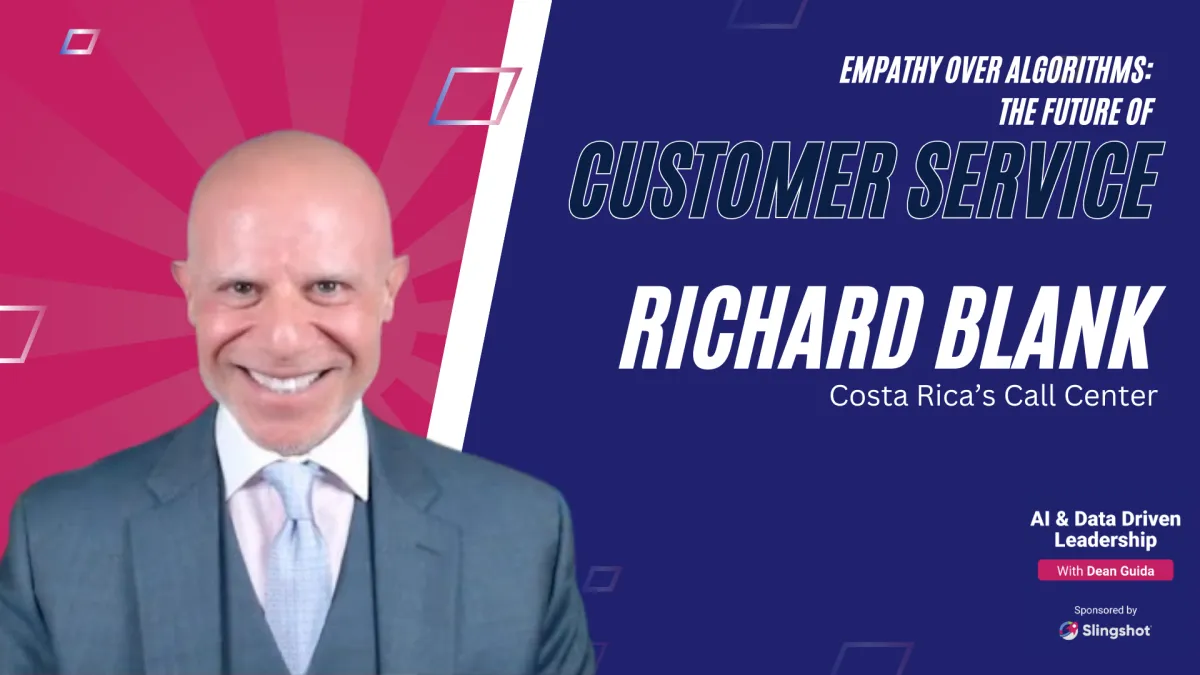Blog

9 - Empathy Over Algorithms: The Future of Customer Service
The Evolving Call Center Industry: Insights from Richard Blank, CEO of Costa Rica's Call Center
In a recent episode of our podcast, we had the pleasure of hosting Richard Blank's, the CEO of Costa Rica's Call Center. Richard shared his invaluable insights into the call center industry, particularly focusing on the impact of AI, the importance of human empathy, and effective communication techniques. This blog post will delve into the key themes discussed in the episode, providing actionable advice and detailed explanations to guide our readers.
The Impact of AI on the Call Center Industry
Efficiency and Data Gathering
AI has revolutionized the call center industry by enhancing efficiency and streamlining processes. Richard highlighted how AI can handle basic tasks such as data gathering, which allows human agents to focus on more complex interactions. However, he emphasized that AI should complement, not replace, human agents.
The Last 10%: Human Empathy
While AI can manage routine tasks, the last 10% of customer interactions require genuine human empathy. Richard pointed out that when dealing with sensitive issues, such as medical or legal concerns, the human touch is irreplaceable. Automated systems often fall short in these scenarios, leading to customer frustration.
Actionable Advice:
Integrate AI for Routine Tasks:** Use AI to handle repetitive tasks like data entry and initial customer queries.
Focus on Human Interaction for Complex Issues:** Ensure that human agents are available for more nuanced and sensitive customer interactions.
Train Agents in Empathy:** Develop training programs that emphasize the importance of empathy and effective communication.
The Importance of Human Connection in Customer Service
Building Relationships
Richard stressed that customer service is not just about resolving issues but also about building relationships. Customers are more likely to recommend a company based on the relationships they build with its representatives.
Effective Communication Techniques
Richard shared several techniques to enhance communication in a call center setting:
Use Diplomatic Language:** Defuse situations by allowing customers to express their frustrations and then resetting the conversation.
Acknowledge Emotions:** Recognize that customers may be experiencing significant life events and respond with empathy.
Clarify and Confirm:** Use the customer's name, ask clarifying questions, and ensure they feel heard.
Actionable Advice:
Personalize Interactions:** Train agents to use customers' names and acknowledge their emotions.
Develop Communication Scripts:** Create scripts that include diplomatic language and techniques for defusing tense situations.
Encourage Active Listening:** Teach agents to listen actively and respond thoughtfully to customer concerns.
Hiring and Training Practices
Hiring for Attitude and Skills
Richard prefers to hire individuals who may not have call center experience but possess the right attitude and skills. He looks for candidates who demonstrate higher cognitive skills and discipline, which makes them easier to train.
Training for Communication and Empathy
Training at Costa Rica's Call Center focuses on expanding vocabulary and communication techniques. Richard encourages the use of positive language and personal connections to build rapport with customers.
Actionable Advice:
Hire for Potential:** Look for candidates with the right attitude and cognitive skills, even if they lack direct experience.
Invest in Training:** Develop comprehensive training programs that focus on communication techniques and empathy.
Use Real-Life Scenarios:** Incorporate real-life scenarios into training to help agents practice and refine their skills.
The Role of Tone and Body Language
Non-Visual Communication
Richard emphasized the importance of tone and body language, even in a non-visual context like phone calls. He shared techniques for using tone, inflection, and pauses to convey empathy and confidence.
Phonetic Micro-Expression Reading
Richard introduced the concept of phonetic micro-expression reading, which involves analyzing the speed and volume of a customer's speech to gauge their emotions and adjust the conversation accordingly.
Actionable Advice:
Train in Tone and Inflection:** Teach agents to use tone and inflection to convey empathy and confidence.
Practice Phonetic Micro-Expression Reading:** Develop exercises to help agents analyze and respond to the speed and volume of customers' speech.
Use Pauses Effectively:** Encourage agents to use pauses to allow for questions and gauge customer reactions.
The Future of AI and Human Interaction
Balancing AI and Human Touch
Richard believes that while AI will continue to play a significant role in the call center industry, the human touch will remain essential. He envisions a future where AI handles routine tasks, allowing human agents to focus on building relationships and providing empathetic support.
Appreciating Human Talents
As AI takes over more tasks, Richard predicts that the dedication and uniqueness of human talents, such as art and music, will be more appreciated. He encourages a balance between leveraging AI and valuing human creativity and empathy.
Actionable Advice:
Leverage AI for Efficiency:** Use AI to handle routine and repetitive tasks, freeing up human agents for more complex interactions.
Emphasize Human Skills:** Continue to develop and value human skills such as empathy, creativity, and effective communication.
Foster a Balanced Approach:** Strive for a balance between AI efficiency and the irreplaceable human touch in customer service.
Conclusion
The conversation with Richard Blank provided a wealth of insights into the evolving call center industry. By integrating AI for routine tasks, focusing on human empathy, and developing effective communication techniques, call centers can enhance customer service and build lasting relationships. Richard's experiences and philosophies offer valuable lessons for entrepreneurs and professionals alike, highlighting the importance of empathy, communication, and self-care in achieving success.
For more in-depth discussions and expert advice, be sure to listen to the full episode and stay tuned for future insights from industry leaders.
Link to the episode: https://player.captivate.fm/episode/549961ab-4123-4727-a45e-8c67423d20b0/
Listen and Subscribe to the AI & Data Driven Leadership Podcast Now:
Say "Hey, Siri / Alexa. Play AI & Data Driven Leadership Podcast"
About The Host
Tech entrepreneur and CEO Dean Guida knows there’s a limit to what you can build with grit alone.
At sixteen, Dean bought the first IBM PC and fell in love with writing software. He went on to receive a Bachelor of Science degree in operation research from the University of Miami. After graduating, he was a freelance developer and wrote many systems for IBM and on Wall Street. At twenty-three, he started Infragistics to build UX/UI tools for professional software developers.
Seemingly overnight, Dean had to go from early internet coder to business operator—a feat that forced him to learn some of business’s biggest lessons on the job. He immediately began navigating the nuances of scaling a company, hiring and growing teams, and becoming a leader, a manager, and a mentor.
Fast-forward thirty-five years, and Dean’s tech company now has operations in six countries. More than two million developers use Infragistics software, and its client roster boasts 100 percent of the S&P 500, including Fidelity, Morgan Stanley, Exxon, Intuit, and Bank of America.

Media














